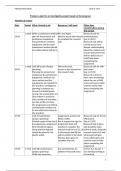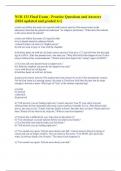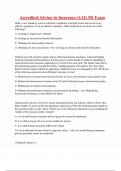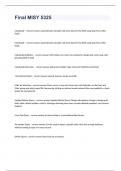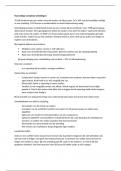35.1: Britain: losing and gaining an empire, 1763-1914
The changing nature of trade
Reasons for, and nature of, the changing patterns of trade, 1763-1914
Government policy
Government economic policy until the late eighteenth century was mercantilist and trade was
‘protected’.
Mercantilists believed that the amount of trade in the world was fixed at any one time; one
country could only expand at the expense of another.
Since the 1650s, the Navigation Acts had protected British trade by controlling the goods that
could be traded and the ships that could be used.
The percentages of the crew that had to be British were set and there was a list of goods that
could only be exported from the colonies and empire to Britain.
The ‘Enumerated List’ controlled trade within the empire. It was designed to ensure that Britain
benefited from all trade between colonies.
Goods on the list could not be traded directly between colonies and had to go via Britain.
The British government could decide how colonial goods would be taxed; this was at the centre
of American objections to the arrival of Indian tea in Boston in 1773.
The Wealth of Nations
Mercantilism was challenged in 1776 by the publication of ‘The Wealth of Nations’ by Adam
Smith.
Mercantilists believed that gold and silver were wealth and that countries should boost exports
and resist imports in order to maximize this metal wealth.
Smith’s stated that a nation’s wealth is really the stream of goods and services that it creates.
The way to maximise it, he argued, was not to restrict the nation’s productive capacity, but to set
it free.
He claimed that productive capacity rests on the division of labour and the accumulation of
capital that it makes possible.
Huge efficiencies could be gained by breaking production down into many small tasks, each
undertaken by specialist hands.
This left producers with a surplus that they can exchange with others, or use to invest in new
and even more efficient labour-saving machinery.
1
, Smith believed that a country’s future income depends upon this capital accumulation. The more
that is invested in better productive processes, the more wealth will be created in the future.
He introduced simple laws of supply and demand. Where things are scarce, people are prepared
to pay more for them: there is more profit in supplying them.
Where there is a glut, prices and profits are low, producers switch their capital and enterprise
elsewhere.
Industry should remain focused on the nation’s most important needs, without the need for
central direction. That meant free trade and competition.
Free trade and competition would result in cheaper prices, better supplies and greater happiness.
William Pitt the Younger
When Pitt took office, the National Debt stood at £250 million. That was twenty times the
annual revenue of £12.5 million from taxes.
The annual interest on government borrowing, which stood at about £8.3 million, automatically
produced a deficit which was funded by further borrowing resulting in increased interest and an
even greater deficit. National bankruptcy was a strong possibility.
Pitt had to reverse the trend. He had three possible ways of doing this. He could stimulate trade,
increase taxation and/or cut government spending.
Pitt chose to implement all three options as one policy. He also needed to avoid involvement in
any war since wars were the major cause of the debt.
Trade
By the 1780s, the Industrial Revolution was well established in Britain and provided the
possibility of an increasing volume of exports
The 1786 Vergennes (or Eden) Treaty was a commercial treaty with France negotiated
successfully in the face of strong opposition from leading statesmen in both countries.
France wanted British goods and the French market for British exporters’ potential was huge.
It was so favourable to Britain that it created hardship in France which was a cause of the
French Revolution.
France reduced duties on oil, vinegar, wines and spirits. Britain reduced on textiles, pottery,
leather goods and manufactures.
Either country, while neutral, could carry goods freely during a war in which the other was
engaged.
By the terms of the treaty, Britain was left free to negotiate cheaper duties with Spain and
Portugal for oil, wines and spirits because there was no clause limiting British trade solely with
France.
2
,Excise duties
Smuggling became his first target. It was estimated that smuggling exceeded 20% of imports
and accounted for half all tea in Britain, creating an obvious loss of revenue.
High duties made smuggling profitable, so Pitt decided to reduce duties to make the temptation
no longer adequate to the risk.
Tea duties, averaging 119%, were reduced to 25%. Duties also were reduced on wines, spirits
and tobacco.
By 1789, quantity of tea passing through Customs had doubled and in one year (1784-5) the
Exchequer got an extra £200,000.
By 1792, government revenue had increased by £3 m as a result of legal increased consumption.
The 1787 Hovering Act also attacked smuggling by extending the duties of Customs officials to
12 miles off-shore. Again, revenue rose.
The impact of the French Wars, 1793-1815
Exports to Europe, but British manufacturers looked for new markets in North and South
America.
The Continental System did little to dampen trade and Napoleon was reduced to buying
uniforms for his armies from west Yorkshire.
Further progress was limited until the end of the wars and the Treaty of Vienna in 1815. the
exception was the Slave Trade.
The Anti-Slavery movement
The anti-slavery movement began in 1783, when a group of Quakers founded the Society for the
Abolition of the Slave Trade.
William Wilberforce MP became the leader in 1787. He started a campaign in Parliament.
Thomas Clarkson carried out extensive research and collected first hand accounts from sailors
and former slaves.
Clarkson created a network of local groups and organised public meetings and the publication of
pamphlets.
Wilberforce used a diagram of a slave ship to try to persuade MPs to vote to abolish the slave
trade.
The Slave Trade Act was passed in March 1807, making the slave trade illegal throughout the
British Empire.
3
, After the 1807 Act, slaves could still be held, though not sold, within the British Empire. The
slave trade continued illegally through smuggling
In the 1820s, the movement began a campaign against slavery. In 1823, the Anti-Slavery
Society was founded in Britain.
Slavery was abolished in 1833. On 1 August 1834, all slaves in the British Empire were freed.
They remained indentured to their former owners in an apprenticeship that meant gradual
abolition by 1840. Full emancipation for all slaves was legally granted on 1 August 1838.
Huskisson on trade and finance
Until 1823, British trade had operated under a limiting and restricting protectionist structure.
All imported goods were subject to a sliding scale of duties until Huskisson, as President of the
Board of Trade, replaced this in 1823 with a flat rate of 30%.
He also relaxed the Navigation Acts, permitting British colonies to trade directly with other
countries using their own ships but continuing to pay taxes to Britain.
Huskisson then began to establish reciprocal treaties with individual countries, seeking
reductions on specific goods.
He then went on, in 1824, to impose further reductions on rum, wool and raw silk and in 1825
reductions on coffee, cotton, copper ore, iron ore, glass and paper were arranged.
In 1825, after 70 private banks, due to the over-issuing of paper money, fell victim to
bankruptcy
Huskisson persuaded the Bank of England to melt down its gold reserves and circulate
sovereigns.
He also managed to coax parliament into passing a law preventing private banks from printing
notes of less then £1 in value.
Private banks were also granted permission to become joint companies. The restriction on
printing could be seen as reactionary, for most restrictive legislation usually is.
However, this was done for the common good of the country which lends it a claim to be
progressive rather than repressive.
Under a General Act of 1826, proposed by Huskisson, a flat rate of 10% was fixed on all
imported raw materials and a flat rate of 20% was set on all British manufactured goods.
It was through measures such as these that trade and industry was stimulated for they enabled
Britain to increase its purchase, manufacture and export process.
Peel
4
The changing nature of trade
Reasons for, and nature of, the changing patterns of trade, 1763-1914
Government policy
Government economic policy until the late eighteenth century was mercantilist and trade was
‘protected’.
Mercantilists believed that the amount of trade in the world was fixed at any one time; one
country could only expand at the expense of another.
Since the 1650s, the Navigation Acts had protected British trade by controlling the goods that
could be traded and the ships that could be used.
The percentages of the crew that had to be British were set and there was a list of goods that
could only be exported from the colonies and empire to Britain.
The ‘Enumerated List’ controlled trade within the empire. It was designed to ensure that Britain
benefited from all trade between colonies.
Goods on the list could not be traded directly between colonies and had to go via Britain.
The British government could decide how colonial goods would be taxed; this was at the centre
of American objections to the arrival of Indian tea in Boston in 1773.
The Wealth of Nations
Mercantilism was challenged in 1776 by the publication of ‘The Wealth of Nations’ by Adam
Smith.
Mercantilists believed that gold and silver were wealth and that countries should boost exports
and resist imports in order to maximize this metal wealth.
Smith’s stated that a nation’s wealth is really the stream of goods and services that it creates.
The way to maximise it, he argued, was not to restrict the nation’s productive capacity, but to set
it free.
He claimed that productive capacity rests on the division of labour and the accumulation of
capital that it makes possible.
Huge efficiencies could be gained by breaking production down into many small tasks, each
undertaken by specialist hands.
This left producers with a surplus that they can exchange with others, or use to invest in new
and even more efficient labour-saving machinery.
1
, Smith believed that a country’s future income depends upon this capital accumulation. The more
that is invested in better productive processes, the more wealth will be created in the future.
He introduced simple laws of supply and demand. Where things are scarce, people are prepared
to pay more for them: there is more profit in supplying them.
Where there is a glut, prices and profits are low, producers switch their capital and enterprise
elsewhere.
Industry should remain focused on the nation’s most important needs, without the need for
central direction. That meant free trade and competition.
Free trade and competition would result in cheaper prices, better supplies and greater happiness.
William Pitt the Younger
When Pitt took office, the National Debt stood at £250 million. That was twenty times the
annual revenue of £12.5 million from taxes.
The annual interest on government borrowing, which stood at about £8.3 million, automatically
produced a deficit which was funded by further borrowing resulting in increased interest and an
even greater deficit. National bankruptcy was a strong possibility.
Pitt had to reverse the trend. He had three possible ways of doing this. He could stimulate trade,
increase taxation and/or cut government spending.
Pitt chose to implement all three options as one policy. He also needed to avoid involvement in
any war since wars were the major cause of the debt.
Trade
By the 1780s, the Industrial Revolution was well established in Britain and provided the
possibility of an increasing volume of exports
The 1786 Vergennes (or Eden) Treaty was a commercial treaty with France negotiated
successfully in the face of strong opposition from leading statesmen in both countries.
France wanted British goods and the French market for British exporters’ potential was huge.
It was so favourable to Britain that it created hardship in France which was a cause of the
French Revolution.
France reduced duties on oil, vinegar, wines and spirits. Britain reduced on textiles, pottery,
leather goods and manufactures.
Either country, while neutral, could carry goods freely during a war in which the other was
engaged.
By the terms of the treaty, Britain was left free to negotiate cheaper duties with Spain and
Portugal for oil, wines and spirits because there was no clause limiting British trade solely with
France.
2
,Excise duties
Smuggling became his first target. It was estimated that smuggling exceeded 20% of imports
and accounted for half all tea in Britain, creating an obvious loss of revenue.
High duties made smuggling profitable, so Pitt decided to reduce duties to make the temptation
no longer adequate to the risk.
Tea duties, averaging 119%, were reduced to 25%. Duties also were reduced on wines, spirits
and tobacco.
By 1789, quantity of tea passing through Customs had doubled and in one year (1784-5) the
Exchequer got an extra £200,000.
By 1792, government revenue had increased by £3 m as a result of legal increased consumption.
The 1787 Hovering Act also attacked smuggling by extending the duties of Customs officials to
12 miles off-shore. Again, revenue rose.
The impact of the French Wars, 1793-1815
Exports to Europe, but British manufacturers looked for new markets in North and South
America.
The Continental System did little to dampen trade and Napoleon was reduced to buying
uniforms for his armies from west Yorkshire.
Further progress was limited until the end of the wars and the Treaty of Vienna in 1815. the
exception was the Slave Trade.
The Anti-Slavery movement
The anti-slavery movement began in 1783, when a group of Quakers founded the Society for the
Abolition of the Slave Trade.
William Wilberforce MP became the leader in 1787. He started a campaign in Parliament.
Thomas Clarkson carried out extensive research and collected first hand accounts from sailors
and former slaves.
Clarkson created a network of local groups and organised public meetings and the publication of
pamphlets.
Wilberforce used a diagram of a slave ship to try to persuade MPs to vote to abolish the slave
trade.
The Slave Trade Act was passed in March 1807, making the slave trade illegal throughout the
British Empire.
3
, After the 1807 Act, slaves could still be held, though not sold, within the British Empire. The
slave trade continued illegally through smuggling
In the 1820s, the movement began a campaign against slavery. In 1823, the Anti-Slavery
Society was founded in Britain.
Slavery was abolished in 1833. On 1 August 1834, all slaves in the British Empire were freed.
They remained indentured to their former owners in an apprenticeship that meant gradual
abolition by 1840. Full emancipation for all slaves was legally granted on 1 August 1838.
Huskisson on trade and finance
Until 1823, British trade had operated under a limiting and restricting protectionist structure.
All imported goods were subject to a sliding scale of duties until Huskisson, as President of the
Board of Trade, replaced this in 1823 with a flat rate of 30%.
He also relaxed the Navigation Acts, permitting British colonies to trade directly with other
countries using their own ships but continuing to pay taxes to Britain.
Huskisson then began to establish reciprocal treaties with individual countries, seeking
reductions on specific goods.
He then went on, in 1824, to impose further reductions on rum, wool and raw silk and in 1825
reductions on coffee, cotton, copper ore, iron ore, glass and paper were arranged.
In 1825, after 70 private banks, due to the over-issuing of paper money, fell victim to
bankruptcy
Huskisson persuaded the Bank of England to melt down its gold reserves and circulate
sovereigns.
He also managed to coax parliament into passing a law preventing private banks from printing
notes of less then £1 in value.
Private banks were also granted permission to become joint companies. The restriction on
printing could be seen as reactionary, for most restrictive legislation usually is.
However, this was done for the common good of the country which lends it a claim to be
progressive rather than repressive.
Under a General Act of 1826, proposed by Huskisson, a flat rate of 10% was fixed on all
imported raw materials and a flat rate of 20% was set on all British manufactured goods.
It was through measures such as these that trade and industry was stimulated for they enabled
Britain to increase its purchase, manufacture and export process.
Peel
4


